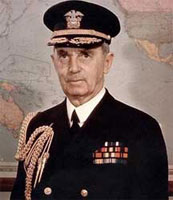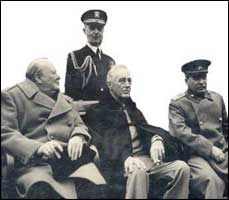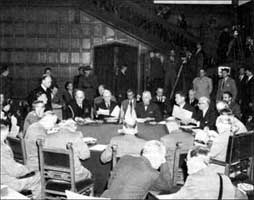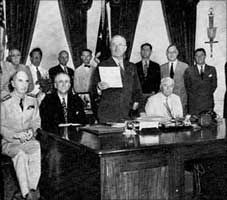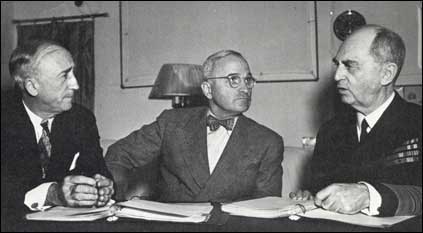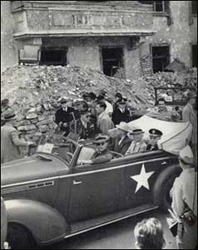This sinister Fenian conned President Truman into nuking Japan and then said that it was a BARBARIC weapon and totally unnecessary to win the war!! Before Pearl Harbor, U.S. citizens despised the military as a waste of money....The only threat to the country came from British control of Canada . . . but you can be sure that it never occurred to the military to enforce the Monroe Doctrine.
Standing armies and navies were always mistrusted by freedom loving people. The Constitution calls for CIVILIAN control over the military in the person of the President as commander in chief. Generals do not like taking orders from CIVILIANS. Here is a quote from a biography of Admiral Leahy entitled Witness to Power published by the Naval Institute Press:
The intense brainwashing by the Roosevelt Reich changed all that. A standing army in peacetime is the most dangerous enemy a Republic can have. Leahy was Roosevelt's shadow—following him EVERYWHERE. Roosevelt had a good working relationship with "Uncle Joe" Stalin but the defeat of Nazi Germany changed everything. When Germany surrendered on May 7, 1945, Russia redeployed her huge armies to the Far East and was preparing to enter the war against Japan. Admiral Leahy says use of the atomic bomb was "BARBARIC"The double-dealing conniving fiendish Fenian was in charge of every aspect of the development of the atomic bomb.
This sinister, cunning, and conniving admiral published his autobiography in 1950. In his memoirs, he condemned the use of the bomb as unnecessary and barbaric. He was the highest ranking military officer in the U.S.—with full responsibility for the Manhattan Project. He was the boss of EVERYBODY that was involved in the project including Groves and Parsons. This double-talking admiral said that the use of the bomb was like the use of poison gas—a WAR CRIME!! Here is a brief excerpt from his autobiography:
President Truman had absolutely no idea of the development of the atomic bomb until Byrne's filled him in on the details.
Part of their argument was the enormous amount of money that Leahy and the military had already secretly spent. Truman, they said, would have to answer to Congress and that could cost him and the Democrats the next election. Truman should have been back in the U.S. negotiating for the surrender of Japan—without the use of the bomb. Byrnes and Leahy made SURE that he would be out of the country and away from the White House during that critical time. Official Chronology of Admiral William D. Leahy Leahy's ancestors were born in Ireland but they were dedicated British imperialists.
References Adams, Henry H. Witness to Power. The Life of Fleet Admiral William D. Leahy. Naval Institute Press, Annapolis, Maryland, 1985. Leahy, William D. I Was There. McGraw Hill Book Co., New York, 1950.
|
